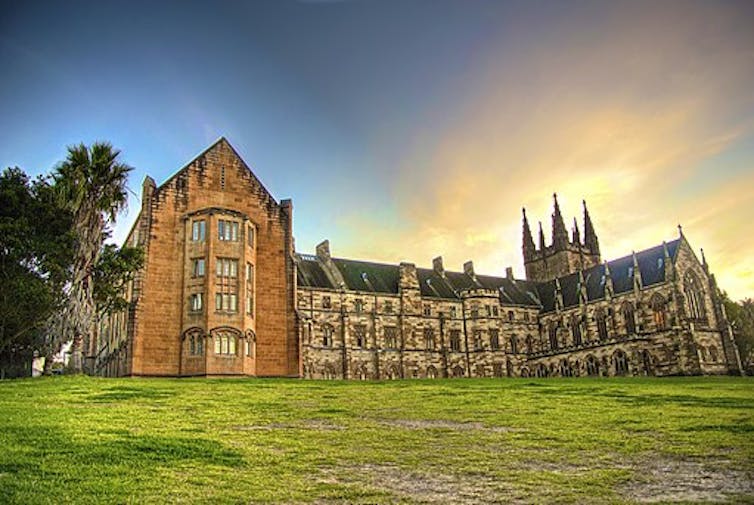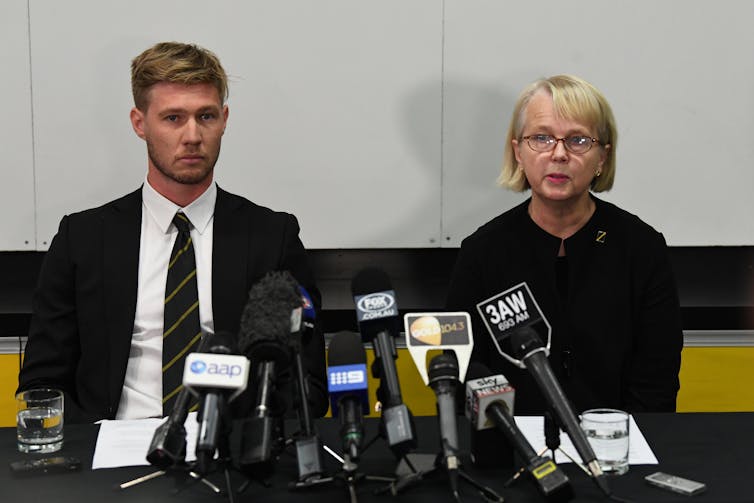we need to address men's cultures
- Written by Ben Wadham, Associate Professor, School of Education, Flinders University
The esteemed residential colleges of Sydney University have recently gained intense public scrutiny for fostering cultures of sexual harassment, rape and hazing. The Red Zone Report, produced by independent journalists for End Rape on Campus Australia, presented a harrowing account of men’s tribalism, and elitism in Australia’s universities.
The report focused on 12 universities including all the Group of Eight universities. Across all 39 Australian universities there are 216 residential colleges or halls.
The colleges are sites of social privilege, populated by the wealthy, with histories that include prime ministers, religious leaders and famous judges and sportspeople. That history is challenged by college cultures that celebrate perversity at the expense of the traditions of academic scholarship and community service.
Welcome to university
Orientation Week (O Week) is an exciting time for all university students embarking on a new year of study. But O Week has become known as “The Red Zone”. During this period, sexual harassment, hazing and college rituals spike in incidence.
The report was released to highlight this.
Residential colleges are a hotspot for these activities. They have similarities to other education or training institutions, such as the Royal Military College, religious seminaries or apprenticeship schools. These are closed, insular, elitist and culturally formalised environments.
 St John’s College at the University of Sydney, one of the colleges named in the report as a site of hazing.
Wikimedia Commons/Jason Tong, CC BY
St John’s College at the University of Sydney, one of the colleges named in the report as a site of hazing.
Wikimedia Commons/Jason Tong, CC BY
The college system dates back to the mid-19th century. Most colleges were founded on the contributions of wealthy private individuals in the mid-1900s. The colleges hark back to British aristocracy but have become increasingly divorced from the principles of education and scholarship over time.
The colleges remain capitalised by wealthy families as their children pass through from generation to generation. Their Christian foundations have been used as proof of their moral authenticity.
Wealth and privilege are sustained by social connections that serve to mask and silence these cultures and their practices. From managing media events to using influence to avoid independent scrutiny, the colleges instil an overstated sense of purpose and entitlement among their residents.
Sexual assault: how much?
The Red Zone Report explains there are about 30 assaults on university campuses across Australia per day. About 21,000 of the 1.3 million students who attended Australian universities in 2015/16 were subject to sexual assault.
And 23% of women who experienced rape or sexual assault during 2015/16 were assaulted on a university campus. Women were about four times more likely to experience sexual assault on campus than men.
Read more: Beyond #MeToo, we need bystander action to prevent sexual violence
Universities with colleges have the highest rates of sexual assault. College students were seven times more likely than non-college students to have been raped or sexually assaulted on campus. College women are six times more likely to experience attempted or completed rape or sexual assault, compared to college men.
Don’t our universities know about college hazing?
Evidence of sexual harassment, rape and hazing has been in the hands of universities for many years.
In 2016, Broderick and Co. investigated college culture at Sydney University. The terms of the research were limited. The Broderick report provided important quantitative data on these cultures, but rejected the wider historical and cultural context within which college tribalism is sustained.
The Red Zone report fills the gaps. It describes hazing rituals in detail gathered across Australian universities. The report provides the necessary context of the histories and cultures of abuse in these colleges, and the administrative responses by the universities.
The Red Zone Report is important because it is independent.
The report describes these cultures and the practices of the men inside them. It gives us a wider sense of how these traditions of torture arise as part of young men’s misguided sense of community. The Red Zone Report tells us it is a community based on sexual prurience, conquest and the immaturity of young wealthy Australian men.
These incidents are windows into the wider Australian establishment. Many of our cultural leaders, solicitors, public servants and corporate chiefs with university degrees have been educated in these environments.
The ‘man problem’: it’s about men isn’t it?
In the past two decades or so Australia has seen the “man problem” arise across numerous social institutions.
The elite Australian football codes, the AFL and NRL, are consistently in the media because of matters of men’s culture and behaviour.
 Richmond Tigers player Nathan Broad was named as the person who circulated a nude photo of a woman wearing a premiership medal without her permission last year.
AAP/Julian Smith
Richmond Tigers player Nathan Broad was named as the person who circulated a nude photo of a woman wearing a premiership medal without her permission last year.
AAP/Julian Smith
State and federal police forces have recently undergone reviews into cultures of bullying, harassment and institutional dereliction. These reviews name men and their cultures of masculinity as the principal contexts of abuse. The Royal Commission into Institutional Responses to Child Sexual Abuse is an example of this.
Brothers
Two principal forces sit behind these cultures of violence and depravity: some men use violence to control others, and that violence serves to sustain male domination – in colleges, in universities, and across wider society.
The college system and these men’s dominance is sustained by a kind of brotherhood. Brotherhood is based on the self-interest of the association of men itself. It reflects the demand of a group of lads to have the “freedom” to do as they please.
Brotherhood is produced by men with a sense of licence and tradition. That tradition, and manhood, is sustained through particular rites of passage and rituals of abuse.
Brotherhood brings men together. It keeps men together. It keeps other men and women out.
Changing men
The Red Zone report highlights the way in which universities have been struggling for decades with college cultures and their misogyny, sexual perversity and violence. It names university cultures of abuse and the wealthy, male and often Christian cliques of domination that reside within them.
Read more: Why governments should be cautious about criminalising hazing
This report is another example of male cultures of tribalism and violence across institutions in Australia. These cultures of manhood must be acknowledged publicly. Recommendations or strategies must take addressing men’s cultures as a principal line of inquiry and action.
The Red Zone report provides a line in the sand that no university leader, or any of us, can ignore.
Authors: Ben Wadham, Associate Professor, School of Education, Flinders University




